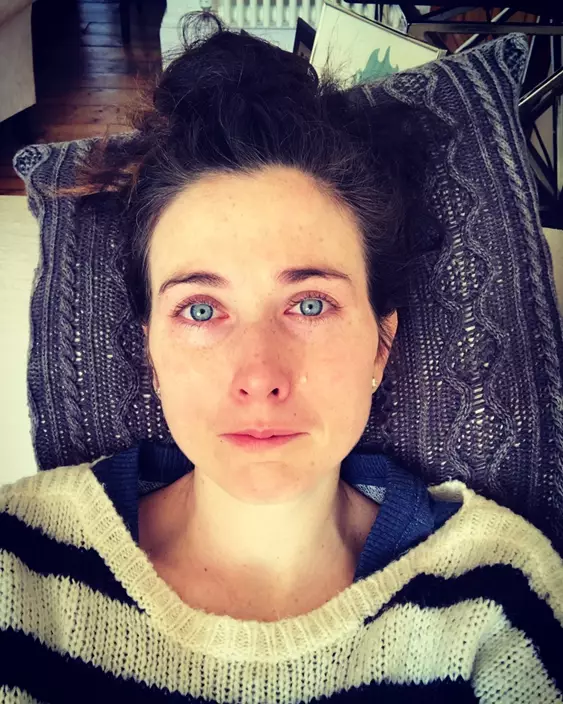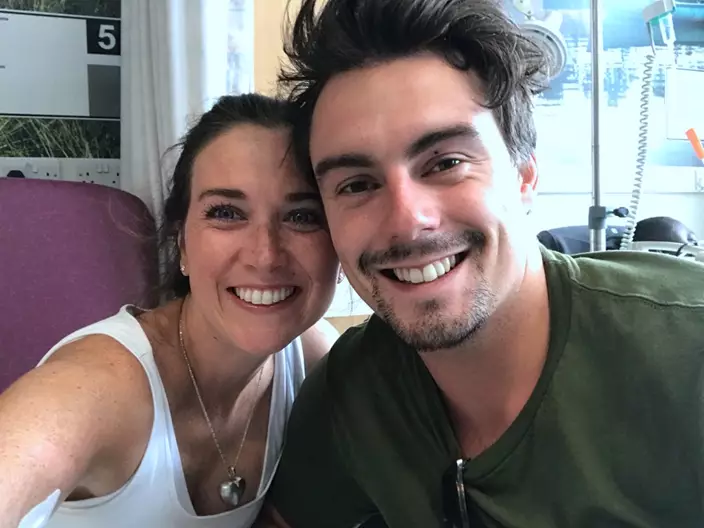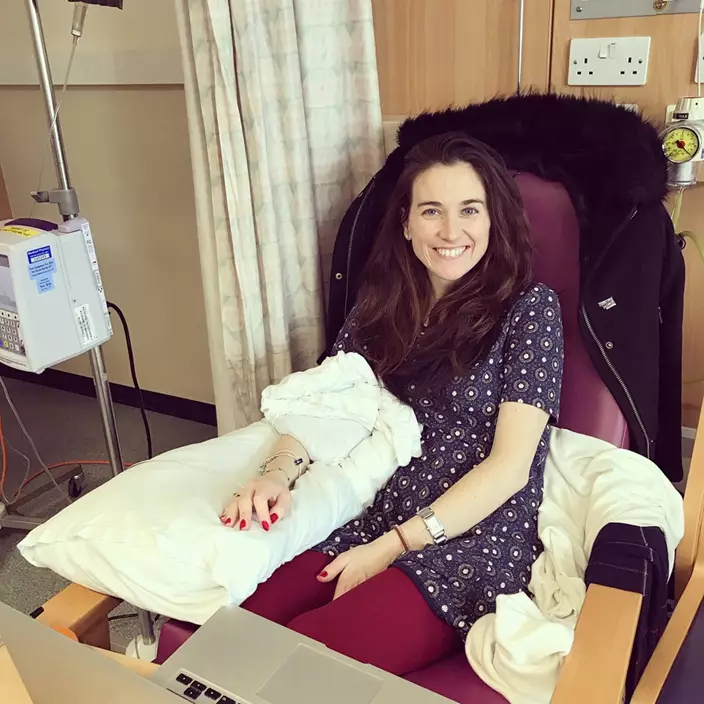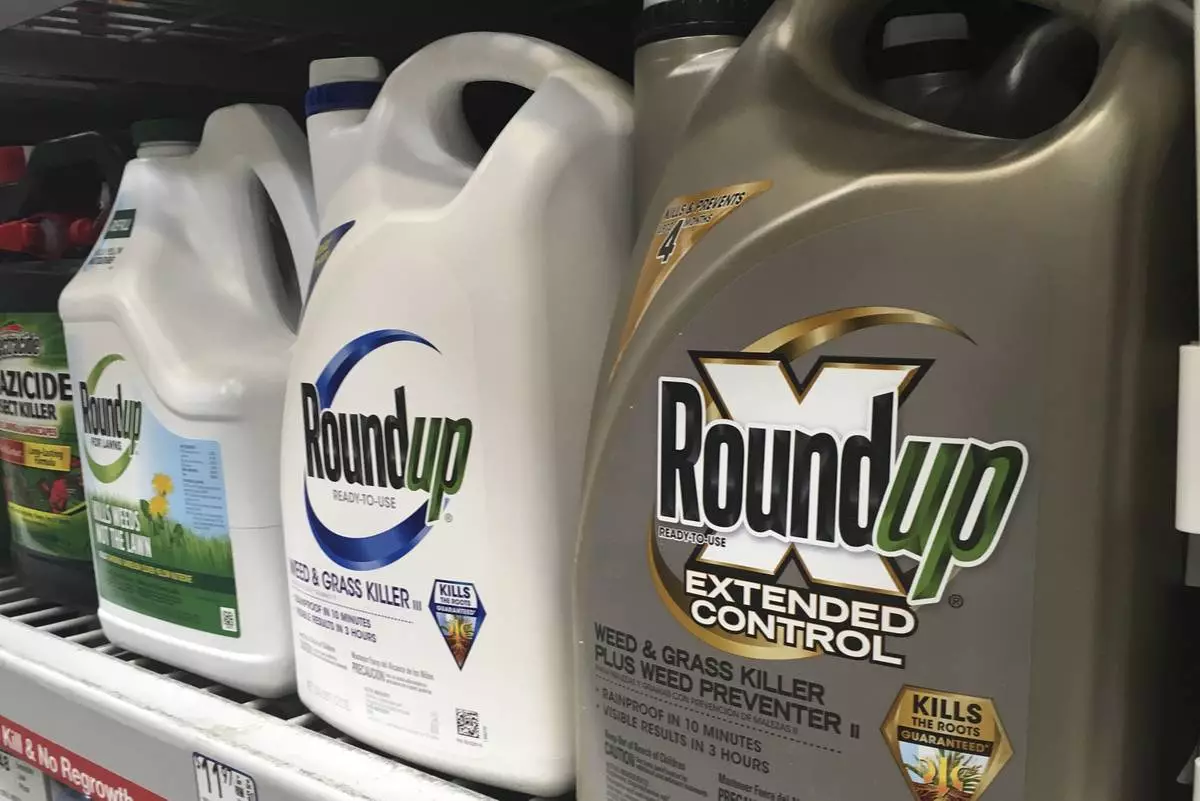Olivia created a poignant video to try to find a stranger who would be willing to carry their baby.
A primary school teacher whose womb was shrivelled by radiation, has taken the unusual step of launching an online appeal for a surrogate – after treatment for bowel cancer at 29 left her unable to carry a baby.
Click to Gallery
Olivia created a poignant video to try to find a stranger who would be willing to carry their baby.
Olivia and her 29-year-old gym owner husband Sam’s joy at creating four embryos from the eggs she had harvested prior to treatment turned sour, when they couple, of St Andrews, Fife, Scotland, discovered the huge waiting list for surrogates.
Olivia – given the all clear in August, after eight months of treatment, including radiotherapy, chemo and surgery to remove the tumour – said: “I know I want to have a child as soon as I can.
Olivia’s problems began in 2015 when, after experiencing tummy trouble, she was diagnosed with a variety of problems, including irritable bowel syndrome and severe period pains.
“It came to a head when I started getting the pain during a doctor’s appointment in late October, and she realised just how bad it was. She told me that my husband needed to drive me to Ninewells hospital for examination.”
“They told me the procedure would take about 40 minutes, but they stopped after about five,” she said. “I was pleased that it wasn’t as bad as I’d expected.
After a sudden deterioration, she was diagnosed with sepsis – a potentially deadly complication of an infection – which doctors believe developed because of the colonoscopy.
Olivia continued: “We desperately wanted a child. We had been trying for eight months before I was diagnosed – although, looking back now, I’m glad I didn’t fall pregnant, because I had cancer and treatment would have harmed the baby.”
She said: “I was so upset at that stage. The doctors told me the treatment would have to stop and they would have to rethink what to do.
After two years of debilitating symptoms, Olivia Rowlands, now 29, was diagnosed with bowel cancer in 2017 and needed targeted radiotherapy, which would destroy her womb and kill her chances of being pregnant, in order to save her life.

Sam and Olivia on their wedding day (Duke Studios/PA Real Life)
Olivia and her 29-year-old gym owner husband Sam’s joy at creating four embryos from the eggs she had harvested prior to treatment turned sour, when they couple, of St Andrews, Fife, Scotland, discovered the huge waiting list for surrogates.
Desperate to become parents, the couple – who met as students at Bath University – have launched an online appeal, including a heartbreaking slideshow of their story, hoping to find a kind-hearted stranger willing to be their surrogate.

Olivia struggling with chemo, March 8, 2018 (Collect/PA Real Life)
Olivia – given the all clear in August, after eight months of treatment, including radiotherapy, chemo and surgery to remove the tumour – said: “I know I want to have a child as soon as I can.
“I joined Surrogacy UK, but the waiting list for a surrogate is long – we would probably have to wait for at least a year – and most surrogates and parents are matched at socials.”
She continued: “Being in Scotland, it’s quite hard for me to get to any, as they are in the south of England. I decided to try some of the online surrogacy groups and created a video to tell our story.”

Olivia waking up from surgery to save her ovary, April 25, 2018 (Collect/PA Real Life)
Olivia’s problems began in 2015 when, after experiencing tummy trouble, she was diagnosed with a variety of problems, including irritable bowel syndrome and severe period pains.
But when the pain intensified at the start of 2017, she actually asked her doctor if it could be bowel cancer.
She said: “The doctor told me not to worry, because it usually happens to people over 50. The pain I was getting was so severe I couldn’t move and I was constantly having either constipation or diarrhoea. I was also seeing blood in my stools and I lost nearly two stone.

Olivia and Sam at her last chemo, July 25, 2018 (Collect/PA Real Life)
“It came to a head when I started getting the pain during a doctor’s appointment in late October, and she realised just how bad it was. She told me that my husband needed to drive me to Ninewells hospital for examination.”
Referred to a specialist a few weeks later, doctors told Olivia had inflamatory bowel disease and she was then referred for a colonoscopy.
On December 13, Olivia had the procedure – when a camera is used to examine the lining of the large bowel – at Fernbrae hospital, Dundee.

Olivia at her first chemo session, March 7, 2018 (Collect/PA Real Life)
“They told me the procedure would take about 40 minutes, but they stopped after about five,” she said. “I was pleased that it wasn’t as bad as I’d expected.
“But afterwards, the consultant took me into a room and said they had found something. It took me a good few minutes to realise they meant cancer.”
She added: “They’d found a tumour in my bowel and weren’t able to get past it to go any further.”
Six days later, with her mum, Margaret Baxter, who had been living in Dubai with her dad, Colin, back in Scotland and by her side, she was rushed to hospital.

Olivia and Sam in Dubai, August 2017, three months before diagnosis (Collect/PA Real Life)
After a sudden deterioration, she was diagnosed with sepsis – a potentially deadly complication of an infection – which doctors believe developed because of the colonoscopy.
With her cancer treatment put on hold, as she would need to be treated for and to recover from the infection, she was taken for emergency surgery to drain out the infection, because of the sepsis – coming to with a colostomy bag, which she was told would be permanent.
Also told the tumour in her bowel was too big to remove, she needed radiotherapy and chemo to shrink it before surgery. As it had grown so close to her womb, the targeted radiotherapy would damage it, meaning she could not carry a baby.

Olivia and Sam and her parents, Christmas 2017 (Collect/PA Real Life)
Olivia continued: “We desperately wanted a child. We had been trying for eight months before I was diagnosed – although, looking back now, I’m glad I didn’t fall pregnant, because I had cancer and treatment would have harmed the baby.”
She added: “Still, being told that saving my life would mean I might never have children was very hard. The doctors told me they could harvest my eggs, but they couldn’t save my womb and I would never be able to carry a child myself,” Olivia added.
After spending Christmas recovering in hospital, Olivia had 10 eggs harvested and the couple created four embryos.
She then started five weeks of radiotherapy and chemotherapy tablets, but on day four she started to feel worse and was taken back into hospital, where she discovered the sepsis had returned.

Olivia's conversation with a friend about her pain (Collect/PA Real Life)
She said: “I was so upset at that stage. The doctors told me the treatment would have to stop and they would have to rethink what to do.
“They needed my body to fight the sepsis and I had to take a course of antibiotics. It was too risky to continue treatment.”
Her consultant advised Olivia that although her tumour was large, they would try to remove some of it through surgery and could possibly fix her colostomy at the same time.
Olivia added: “It was a very complicated operation and we weren’t sure if it would be possible but, amazingly, after nine hours in surgery, I woke up and the doctors told me they had removed the entire tumour and reversed my colostomy to a temporary ileostomy. I was so delighted.”
After that, she faced six gruelling weeks of chemotherapy, followed by five weeks of radiotherapy and a second six-week course of chemo to remove any remaining cancer cells.

Olivia going on holiday to Biarritz, June 2018 (Collect/PA Real Life)
“Finishing chemo was very emotional,” she said. “I filmed the moment and I was just overcome with tears.”
She continued: “I was so glad it was over, but quite sad that I wasn’t going to see the amazing staff at Ninewells every day. They have been so incredible. I can’t thank them enough for everything they have done for me.”
Told she was cancer free a month ago, Olivia also learned that doctors had spotted a small blood clot in her lung.
Now on medication to disperse the clot, they are hoping to reverse her temporary ileostomy in the next few months.
“It’s been a very hard year, but I am so glad to have come out the other side,” said Olivia.
“I am so thankful to the NHS for treating me so well, but also to my parents, especially my mum, who came for a few days last December and ended up staying for eight months.
“My husband Sam has been by my side every step of the way, making me laugh and helping me when I struggled.”
She added: “One of the things that’s really helped me is talking about my journey through my blog and Instagram page ‘Olivia’s got guts’. I hope that it will help someone else going through this.”
Now, the couple’s thoughts have turned back to finding a surrogate and having a family.
She said: “I hope there is a stranger out there who will connect with our story and give us the greatest gift. We just want a family together and we want to do that as soon as we can.”
She continued: “I’m also speaking out as part of Bowel Cancer UK’s ‘Never Too Young’ campaign, because I want everyone to realise that this disease doesn’t just happen to people over 50.
“I’m on the front cover of a book produced by the charity, called ‘Younger people with bowel cancer: a guide for the under 50s.’
“It provides an introduction to how a diagnosis of bowel cancer at a younger age can affect the body, emotions, relationships and everyday life.”
Olivia added: “I am one of the lucky people, who was diagnosed in time. Now I’m looking forward to a positive future and finding a surrogate to have our baby would really make my life complete.”
For more information visit, www.bowelcanceruk.org.uk
To follow Olivia’s blog, visit www.oliviasgotguts.wordpress.com
DES MOINES, Iowa (AP) — Stung by paying billions of dollars for settlements and trials, chemical giant Bayer has been lobbying lawmakers in three states to pass bills providing it a legal shield from lawsuits that claim its popular weedkiller Roundup causes cancer.
Nearly identical bills introduced in Iowa, Missouri and Idaho this year — with wording supplied by Bayer — would protect pesticide companies from claims they failed to warn that their product causes cancer, if their labels otherwise complied with the U.S. Environmental Protection Agency’s regulations.
But legal experts warn the legislation could have broader consequences — extending to any product liability claim or, in Iowa’s case, providing immunity from lawsuits of any kind. Critics say it could spread nationwide.
"It’s just not good government to give a company immunity for things that they’re not telling their consumers,” said Matt Clement, a Jefferson City, Missouri, attorney who represents people suing Bayer. “If they’re successful in getting this passed in Missouri, I think they’ll be trying to do this all over the country.”
Bayer described the legislation as one strategy to address the “headwinds” it faces. About 167,000 legal claims against Bayer assert Roundup causes a cancer called non-Hodgkin’s lymphoma, which Bayer disputes. The company has won some cases, settled many others but also has suffered several losses in which juries awarded huge initial judgments. It has paid about $10 billion while thousands of claims linger in court.
Though some studies associate Roundup's key ingredient with cancer, the EPA has regularly concluded it is not likely to be carcinogenic to humans when used as directed.
The costs of “defending a safe, approved product” are unsustainable, said Jess Christiansen, head of communications for Bayer's crop science division.
The legislation was introduced in targeted states pivotal to Bayer's Roundup operations and is at a different stage in each. It passed the Iowa Senate, is awaiting debate in the Missouri House and was defeated in Idaho, where this year's legislative session ended.
Farmers overwhelmingly rely on Roundup, which was introduced 50 years ago as a more efficient way to control weeds and reduce tilling and soil erosion. For crops like corn, soybeans and cotton, it’s designed to work with genetically modified seeds that resist Roundup’s deadly effect.
Missouri state Rep. Dane Diehl, a farmer who worked with Bayer to sponsor the legislation, cited concerns that costly lawsuits could force Bayer to pull Roundup from the U.S. market, leaving farmers to depend on alternative chemicals from China.
“This product, ultimately, is a tool that we need," said Diehl, a Republican.
Iowa Gov. Kim Reynolds, a Republican, said in an email the legislation maintains the integrity of the regulatory process and, without it, “Iowa risks losing hundreds of jobs” in Muscatine, an eastern Iowa city where Roundup is mostly produced.
The Associated Press is seeking public records on Bayer’s communications with governor's offices in Iowa, Missouri and Idaho.
Bayer, like other companies, hires lobbyists in states to advocate for its interests. The company backs this legislation in the states where “we have a big, direct economic impact,” Christiansen said.
Roundup’s key ingredient, glyphosate, is derived from phosphate mined in Idaho. And St. Louis is the headquarters of its North America crop science division, acquired in its 2018 purchase of Monsanto. Because of that, many of the lawsuits are filed in Missouri.
The five lobbyists registered for Bayer in Iowa and three in Idaho is largely consistent with recent years, but the number working in Missouri this year ballooned from four to nine. Lobbyist expenditures exceeded $8,000 in Idaho this year; similar information was not available in Iowa or Missouri.
Led by Bayer, a coalition of agricultural organizations called Modern Ag Alliance also is spending tens of thousands of dollars on radio and print advertisements claiming that trial lawyers and litigation threaten the availability of glyphosate.
On its website, the group asserts that at risk are 500 jobs connected to glyphosate production in Iowa, and 800 jobs in Idaho.
Bayer stopped short of threatening closures. The Iowa facilities, including in Muscatine, “are very critical facilities to our business, so we'll remain at some sort of support level,” Christiansen said.
At issue in the lawsuits and legislation is how Bayer – and any other pesticide company — communicates with consumers about the safety of its products.
Companies are required to register products with the EPA, which evaluates — and then reevaluates every 15 years — a pesticide and its label. The EPA reiterated in 2020 that glyphosate used as directed posed no health risks to humans. But a federal appeals court panel in 2022 ruled that decision “was not supported by substantial evidence” and ordered the EPA to review further.
The debate over glyphosate escalated when a 2015 report by the International Agency for Research on Cancer, part of the World Health Organization, said it's “probably carcinogenic to humans" based on “limited” evidence of cancer in people and “sufficient” evidence in study animals.
Based on that international report, California sought to add a cancer warning label to products containing glyphosate. But a federal appeals court ruled against California last November, concluding such a warning wasn't factual.
Christiansen emphasized that many regulatory agencies worldwide agree with the EPA and insisted Bayer has to stick to EPA labeling to ensure it isn't providing false or misleading information. She added that the company is transparent in the information it does provide.
Critics of the legislation aren't convinced, citing examples such as opioids and asbestos that had been deemed safe for use as directed — until they weren't.
There also are concerns that the legislation could stifle any product liability claim since most rely on the argument that a company failed to warn, said Andrew Mertens, executive director of the Iowa Association for Justice, an organization for trial lawyers.
Jonathan Cardi, a product liability and torts expert at Wake Forest University School of Law, also said a strict reading of the Iowa legislation extends beyond liability claims, and “the way it’s drafted makes it interpretable to mean nobody could bring any suit.”
In lobbying lawmakers and in speaking with the AP, Bayer representatives disputed that the legislation would cut off other legal actions. Several legal experts said the legislation is unlikely to affect the 18,000 lawsuits already pending in Missouri’s capital of Jefferson City, and wouldn’t prevent claims in states that don’t adopt similar legislation.
In Idaho, the Republican-led Senate narrowly defeated the bill amid concerns about relying on federal agencies' safety standards and limiting the ability of harmed individuals to sue.
John Gilbert, who farms in Iowa Falls, Iowa, with limited use of Roundup, called Republicans hypocritical for attempting to protect corporate interests after campaigning on standing up for Iowans.
The bill “invites a lot of reckless disregard," said Gilbert, who is on the board for the Iowa Farmers Union. “No amount of perfume’s gonna make it anything but a skunk."
Lieb reported from Jefferson City, Missouri.

FILE - Soybeans are seen in a field on a farm, Friday, Sept. 2, 2016, in Iowa. The maker of a popular weedkiller is turning to lawmakers in key states to try to squelch legal claims that it failed to warn about cancer risks. (AP Photo/Charlie Neibergall, File)

FILE - The Bayer AG corporate logo is displayed on a building of the German drug and chemicals company in Berlin, Monday, May 23, 2016. Bayer, the maker of a popular weedkiller, is turning to lawmakers in key states to try to squelch legal claims that it failed to warn about cancer risks. Bayer disputes such claims but already has paid about $10 billion to resolve them. (AP Photo/Markus Schreiber, File)

FILE - Phosphate ore is dug up and transported from Monsanto Company's South Rasmussen Mine site near Soda Springs, Idaho, July 16, 2009. Bayer acquired Monsanto in 2018. Bayer, the maker of a popular weedkiller, is turning to lawmakers in key states to try to squelch legal claims that it failed to warn about cancer risks. The company disputes such claims. A key ingredient of the weedkiller, glyphosate, is derived from phosphate mined in Idaho. (Bill Schaefer/The Idaho State Journal via AP, File)

FILE - Containers of Roundup are displayed on a store shelf in San Francisco, Feb. 24, 2019. Thousands of legal claims against drug and chemicals company Bayer assert Roundup causes a cancer called non-Hodgkin’s lymphoma, which Bayer disputes. (AP Photo/Haven Daley, File)

FILE - A soybean field is sprayed in Iowa, July 11, 2013. The maker of a popular weedkiller is turning to lawmakers in key states to try to squelch legal claims that it failed to warn about cancer risks. (AP Photo/Charlie Neibergall, File)






















